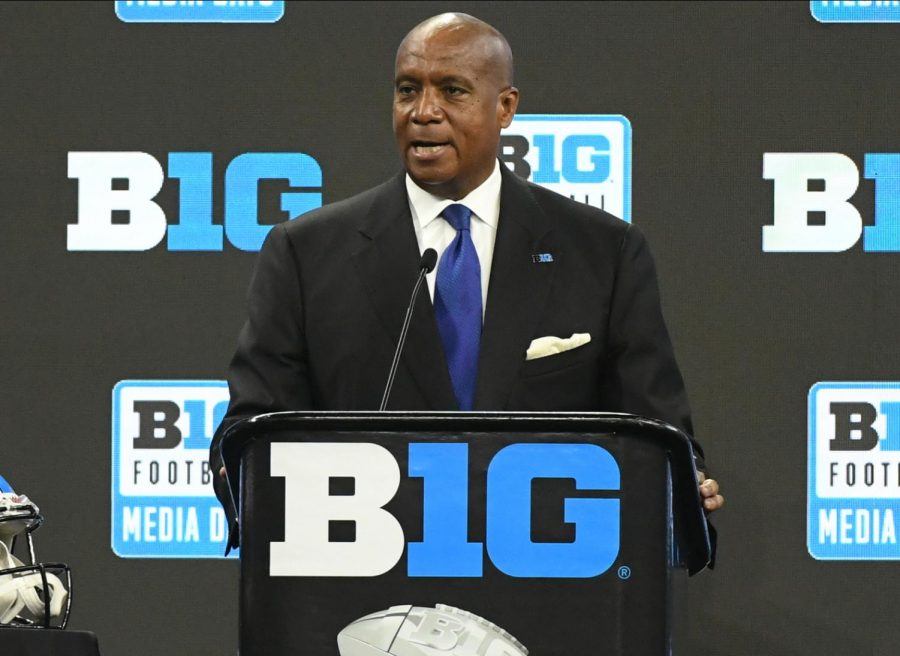Big Ten Conference Commissioner Kevin Warren comments on league expansion, COVID-19
Warren spoke with reporters at a Big Ten Football Media Days press conference at Lucas Oil Stadium in Indianapolis, Indiana, Thursday morning.
© Robert Goddin-USA TODAY Sports
Jul 22, 2021; Indianapolis, Indiana, USA; Big 10 commissioner Kevin Warren speaks to the media during Big 10 media days at Lucas Oil Stadium. Mandatory Credit: Robert Goddin-USA TODAY Sports
July 22, 2021
INDIANAPOLIS — Big Ten Conference Commissioner Kevin Warren kicked off the league’s annual football media days at Lucas Oil Stadium with a press conference Thursday morning.
Amid his second full year as commissioner of the Big Ten, Warren discussed the league’s COVID-19 protocols for the 2021-22 football season and its potential to add more teams.
Alvarez named Big Ten Conference’s special advisor for football
Before he took questions from reporters, Warren announced that the Big Ten’s league office had hired former University of Wisconsin Director of Athletics Barry Alavarez. The 74-year-old Pennsylvania native will serve as the conference’s special advisor for football.
“Barry has been blessed with an illustrious career in college athletics, and his impact on college football and the Big Ten Conference has been significant,” Warren said. “He understands the history and traditions of the Big Ten. I trust Barry, and we look forward to working with him on relevant football-related issues and building upon the strong relationships we have with the College Football Playoff, our broadcast and bowl partners, as well as our member institutions and student-athletes.”
Alvarez stepped down from his athletic director position at Wisconsin June 30. He will take on his new role with the Big Ten Conference Aug. 2.
Alvarez coached on former Hawkeye head coach Hayden Fry’s University of Iowa football staff from 1979 to 1986. At Iowa, Alvarez coached alongside the late Fry, current Iowa head coach Kirk Ferentz, former Iowa State head football coach Dan McCarney, and former Kansas State head football coach Bill Snyder.
Big Ten Conference adopts decentralized COVID-19 policies and procedures
At their semiannual meeting on June 6, presidents and chancellors from the Big Ten Conference’s 14 member institutions elected to adopt a decentralized approach to COVID-19 for the 2021-22 football season.
Per Warren, the league’s 14 schools will develop their own virus guidelines for the upcoming fall athletics season.
“We have allowed our institutions to choose how to handle [COVID-19],” Warren said. “. . . We will get [institutions’ policies and procedures] in early August. We’ll combine it, and then we’ll get together with our chancellors and presidents and other people to make the determination as to how we handle the fall . . . We’re right where we want it to be, is that it will be a decentralized decision-making process. As soon as we gather all the information from our schools in early August, we’ll finalize our policies and make sure that we pressure-tested as much as we possibly can.”
On July 2, the University of Iowa officially announced its plan to allow fans to attend its football games at Kinnick Stadium at full capacity this fall.
Throughout the 2020-21 sports seasons, the Big Ten enforced rigorous COVID-19 testing and safety protocols. Before COVID-19 vaccinations became available to the masses, the league required all its student-athletes to be tested for COVID-19 daily.
RELATED: Big Ten schools to collectively share cost of rapid COVID-19 tests
Warren doesn’t rule out Big Ten expansion
Since 2014, the Big Ten Conference has been home to the same 14 teams: Iowa, Illinois, Rutgers, Maryland, Michigan State, Michigan, Northwestern, Minnesota, Nebraska, Wisconsin, Penn State, Indiana, Ohio State, and Purdue.
On July 21, The Houston Chronicle reported that both Oklahoma and Texas are considering a departure from the Big 12 and an entrance into the Southeastern Conference (SEC). According to Sports Illustrated, Texas and Oklahoma could join the SEC as soon as their Big 12 media contracts expire in 2025.
On the winds of that news, Warren mentioned that the Big Ten is always considering all its options with regard to expansion.
“We’re at an inflection point in college athletics,” Warren said. “. . . I know, from where we sit, we’re always constantly evaluating what’s in the best interest of the conference. It’ll be interesting to see how that [Texas-Oklahoma] story evolves and where it lands.”



